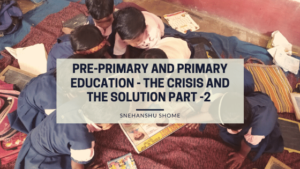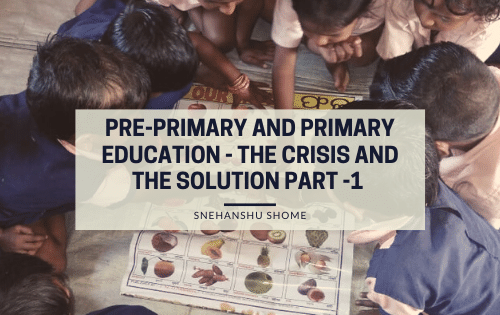What studies say on Early Childhood Education
Early education is the education that children typically receive before being enrolled in school as a grade one student. For many reasons, this is an extremely important step in children’s education. Ninety percent of brain growth occurs by age 5. This means that the education children receive during those years will be particularly meaningful.ThinkZone works to maximize this period of children’s brain development through their Quality Learning Initiative (Q.L.I) Program in Anganwadis, wherein Anganwadi teachers focus on developing age-appropriate skills of children between the ages of 3 to 5. In his paper “Long-Term Cognitive and Academic Effects of Early Childhood Education on Children in Poverty”, Steven Barnett reports his findings that “A wide range of programs specifically designed to improve the education of these children before age 5 has been shown to produce immediate effects on IQ and achievement of about… 8 IQ points” (1998).
The goal of this program is to give children the necessary skills to succeed in school. As UNICEF points out, “ a growing body of evidence points to the fact that there is a learning crisis in India: children are enrolled in school but failing to learn even the basics. This crisis may begin long before children ever enter grade 1”.
Early Childhood Education has seen to have a significantly positive effect on children’s future educational experience. A longitudinal study conducted by Irving Lazar et al. found that children who received early education were less likely to repeat a grade. They were also less likely to be placed in special education classes than their counterparts (Lazer et al. 1982). There are also long-lasting benefits of Early Childhood Education. One study analyzing the long-term effects showed that “programs combining early childhood education and family support services have helped to prevent delinquency and antisocial behavior” into adulthood (Yoshikawa H. Long-term effects of early childhood programs on social outcomes and delinquency. Future Child. 1995;5(3):51-75.).
ThinkZone provides these Anganwadi teachers with skill-enhancement workshops- both online and offline and activity-based teaching resources. Additionally, they have access to ThinkZone’s mobile application platform for classroom management, assessments & learning activities.
Itishree, who is part of the ThinkZone team that supports Aganwandi workers, described her experience. “When we started it was a little difficult…because…we found that they are burdened with [a lot of work]” leaving them insufficient time to develop skills and curriculums. Anganwadi workers were tasked with many responsibilities outside of educating the children. They were responsible for things such as vaccinating children. They were left unable to focus on the education that they were providing the preschoolers in their Anganwadi centers.
ThinkZone stepped in and began to organize gatherings with Anganwadi workers. Together they would work on developing a curriculum that is simple and effective. Itishree explained that after implementing these new lesson plans, Anganwadis have seen an increase in the children’s interest in school and in their skills. They enjoy the props and resources given to them by ThinkZone.
Across the board, ThinkZone has seen tremendous success, with more children gaining the necessary skills needed to succeed in school. These children are taught skills which their parents often don’t have time or the ability to teach them. By giving the Anganwadi workers the knowledge and support necessary, ThinkZone empowers them to deliver excellent education to these children. In turn, these children are given the chance to excel at school and eventually go on to college. They will have the ability to choose and excel in the profession of their choice. While at first glance it seems like Early Childhood Education just impacts the child’s school experience, in reality, the impact is much greater than that. Communities are strengthened when the youth are educated. Crime decreases and prosperity increases. When children stay in school they are less likely to engage in destructive behavior.
ThinkZone’s Quality Learning Initiative has given children opportunities that they may never have been given otherwise. Parents can relax knowing that their children will enter primary school with the necessary skills. They can be confident that their children will succeed and feel comfortable in their scholastic environment in the future years.
Blog by: Michal Assouline
https://earlychildhoodny.org/blog/research-on-the-positive-effects-of-early-childhood-education/
https://www.rasmussen.edu/degrees/education/blog/importance-of-early-childhood-education/
New Harvard Study Reveals Lasting Benefits of Quality Early …www.ffyf.org › new-harvard-study-reveals-lasting-benefits-quality-ea…
https://issblog.nl/2019/08/19/does-attending-preschool-benefit-indian-children-at-a-later-stage-by-saikat-ghosh/


